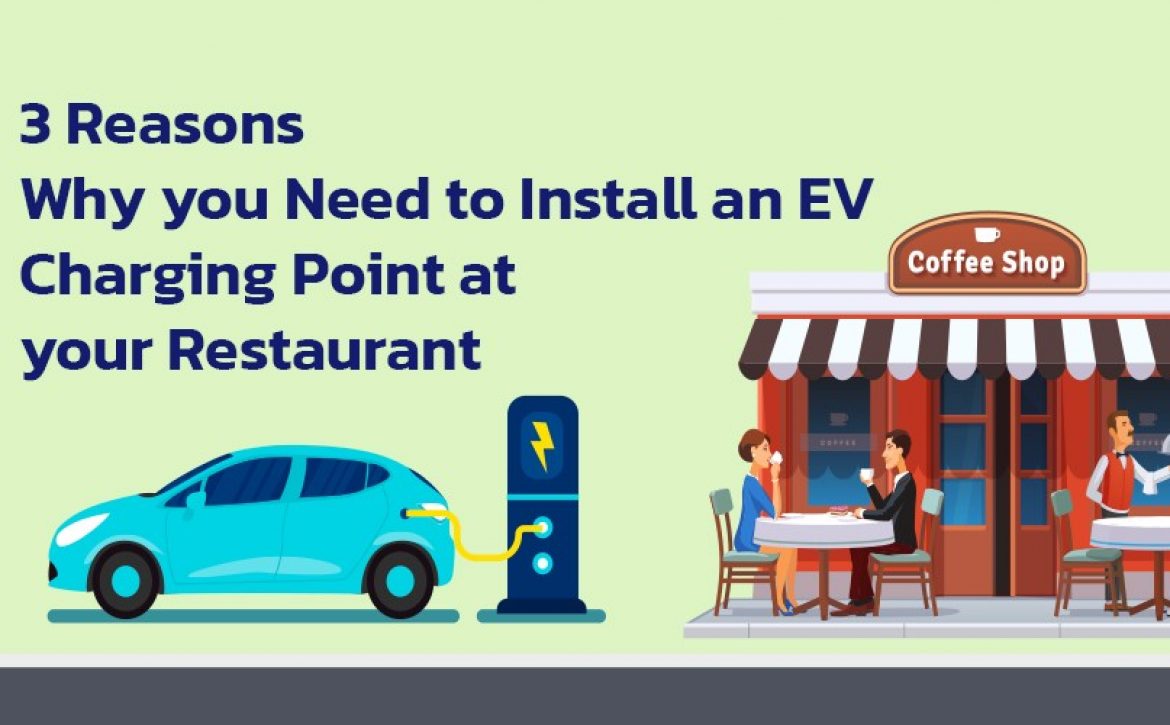3 Reasons Why You Need to Install an EV Charging Point at Your Restaurant
According to IBEF, EV sales in India saw a 168% year-on-year increase in the year 2021. [1]
Spending time to consider your meal options and include some yummy items; why not install EV charging stations in your eatery?
One of the biggest issues facing owners of electric vehicles is the dearth of public charging stations. As a result, drivers could have to wait in long lines to get a charge and continue their journey. By installing EV charging stations outside your restaurant, you may bring in new customers and encourage existing ones to come back.
One of the restaurant trends to stand out from the competition by providing this cutting-edge service to consumers looking for a recharge and a meal is the growing demand for EV charging stations.
How then might your restaurant business benefit from installing EV charging points, let’s explore in depth.
Why EV Charging Points at Restaurants Make Sense
Restaurants have a chance to make money from their parking spaces because there aren’t many charging stations. Why not take advantage of the significant quantity of traffic they already have? An establishment that provides EV charging may draw customers in and keep them there. EV charging stations are the smart choice due to the benefits of longer stay times as well as the increased revenue from charging fees.
What type of Electric charging solution a restaurant wishes to use is the major question to ask. The two primary EV charger types are Level 2 and DC Fast Charging (DCFC). Using Level 2 chargers, which require low power input, an electric car battery can be completely recharged in three to four hours. Level 2 chargers, sometimes known as “slow” chargers, are perfect for restaurants and retail establishments because local EV drivers typically don’t need a full recharge, so the hour or so they spend in your restaurant will be plenty to give them a top-up. Fast chargers can fully charge an automobile in around 30 minutes, but many businesses choose not to install them because doing so requires expensive adjustments to the electrical infrastructure.
Benefits of Installing EV Chargers at Restaurants
You must be able to manage any installed EV charging points at your restaurant, whether there are one or more of them. Restaurant owners can easily manage all of the EV charging stations on their site with our dependable, user-friendly EV app. Additionally, you may quickly establish charging costs per kWh for your visitors and view the current status of each EV charger. You could even let your employees charge their electric vehicles at different rates and at separate hours. The best aspect is that users pay via an app during the entire procedure, which is cashless.
• Draw Increased Footfall
In the years to come, as more people drive EVs, more potential customers will be looking for places to charge their cars as they shop and conduct business throughout the day. Additionally, eating out is a great way to “fill up.” They stay long enough to give their EV batteries a considerable boost whether they stay for a few hours for happy hour or dinner after work or an hour for lunch. Restaurants using level 2 charges may extend a customer’s vehicle’s range by 15 to 25 miles during lunch, while those that use level 3 chargers could even offer a full recharge before the customer must leave for work.
• Capture Pent-Up Profits
Restaurants with EV charging stations can immediately boost the amount of money they make from each customer in addition to seeing an increase in foot traffic. Consider the client who wants to stay a little bit longer during lunch or happy hour to extend their charging time. They opt to get a dessert or another drink while they wait, which raises their bill and increases the restaurant’s income. Second, it’s possible that many restaurant owners haven’t thought about the potential income the charging stations could bring in. Owners can turn the cost of installing EV chargers into another source of income by enforcing a usage fee. They may even make this a benefit by giving patrons credit when they spend more money at the eatery.
• Facilitate EV Uptake
Restaurants that have EV charging stations can be proud of their involvement in a significant movement. Every company that adds EV charging stations advances the adoption of EVs by a small amount. It is that much simpler to contemplate an EV when they can charge up on the job with that much ease. This gives a movement more traction and will be essential to building a future that is sustainable for both people and the environment. You may argue that it is the most significant advantage of all, despite the fact that it may not directly affect the bottom line.
Conclusion
The roadways are starting to be dominated by electric vehicles. In the same way, charging stations. EV drivers may now charge anywhere they go, including shopping malls, movie theatres, parking lots, hotels, and restaurants, in addition to residences and businesses. Your charging stations allow you to set your own start and/or time rates. Your guests’ payments will cover the electricity bills when they use your stations to charge their devices. During peak times, the money from your charging stations can frequently equal or even exceed your monthly expenses.



